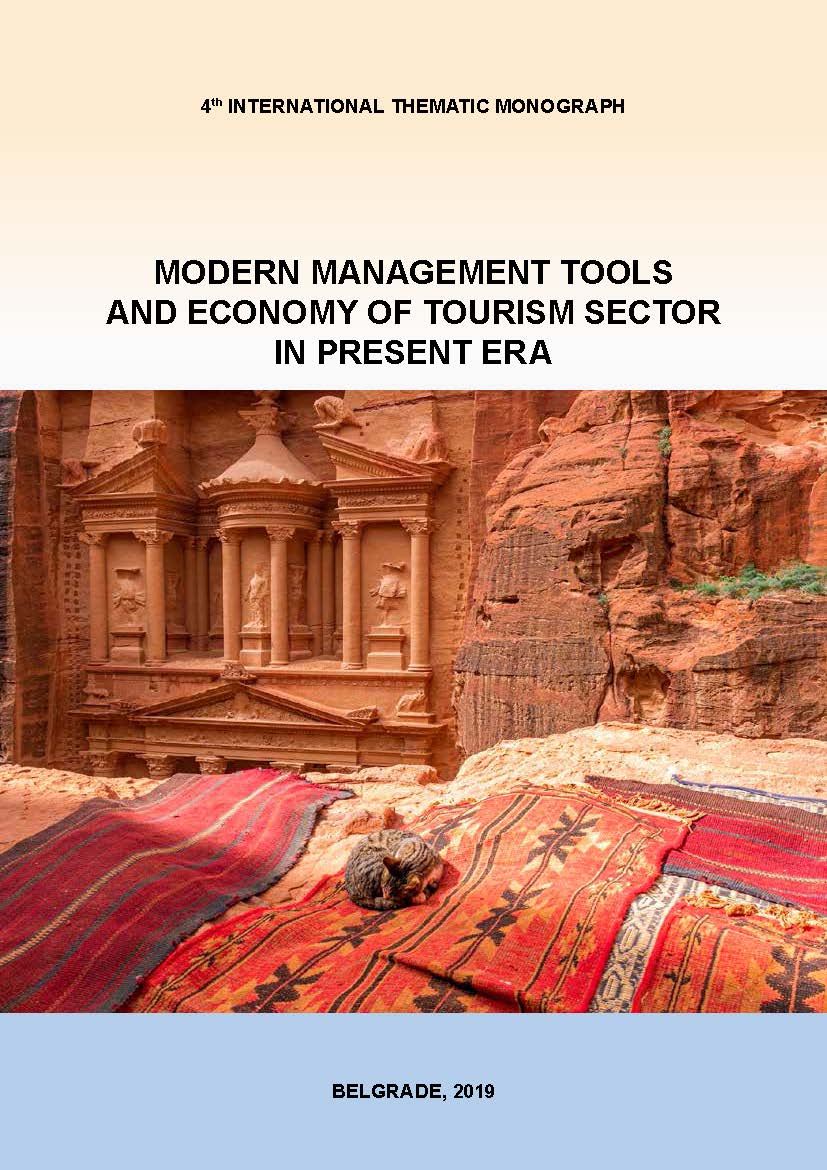|
CLIMATE FRIENDLY URBAN TOURISM, CASE OF HUNGARY Rodgers Isaac Kisiangani African Population and Health Research Center: APHRC Campus Manga Close Parklands, Nairobi, Kenya Éva Erdélyi Budapest Business School - University of Applied Sciences, H- 1054 Budapest, Alkotmány utca 9-11, Hungary DOI: https://doi.org/10.31410/tmt.2019.587 4th International Thematic Monograph - Modern Management Tools and Economy of Tourism Sector in Present Era, Belgrade, 2019, Published by: Association of Economists and Managers of the Balkans in cooperation with the Faculty of Tourism and Hospitality, Ohrid, North Macedonia; ISSN 2683-5673, ISBN 978-86-80194-29-5; Editors: Vuk Bevanda, associate professor, Faculty of Social Sciences, Belgrade, Serbia; Snežana Štetić, full time professor, The College of Tourism, Belgrade, Serbia, Printed by: SKRIPTA International, Belgrade
|
|
Abstract: With the current level of urbanization in the developed economies, it is not surprising that most of destinations are urban areas. Tourism on addition to population growth and immigration is increasing pressure on city natural and manmade resources. In the city, environment comprises of human, social-cultural, economic, technological, legal, nature and climate. All these dimensions of city environment are affected by tourism. This study uses content analysis technique to evaluate urban tourism sustainability so as to shed light on environmental integrity for tourism in urban areas. The selected cities are Budapest, Gyor, Debrecen, Pecs and Szeged. Analysis of the city and tourism related development strategies reveal: increasing cities’ green belt, intelligent mobility and tourism product diversity. Ranking based on these factors could be compared with other rankings. In-depth interviews were conducted which confirm the tourism environmental assessment of tourism strategies and projects, as well as restructuring and redefining tour packages. Keywords: Strategy, Adaptation, Mitigation, Urban tourism. REFERENCES Csomós, G. (2015). The ranking of cities as centres of the Hungarian economy, 1992–2012. Regional Statistics, 5(1), pp.66-85. Zhao, C., Yan, Y., Wang, C., Tang, M., Wu, G., Ding, D. and Song, Y. (2018). Adaptation and mitigation for combating climate change – from single to joint. Ecosystem Health and Sustainability, 4(4), pp.85-94 Owuor, S. (2019). What Are The Biggest Industries In Hungary?. [online] World Atlas. Available at: https://www.worldatlas.com/articles/what-are-the-biggest-industries-in-hungary. html [Accessed 7 Nov. 2019]. E-unwto.org. (2019). Tourism and the Sustainable Development Goals | World Tourism Organization. [online] Available at: https://www.e-unwto.org/doi/book/10.18111/9789284417254 [Accessed 8 Nov. 2019]. Busch, c., et al (2012). Content Analysis. Writing@CSU. Colorado State University. Available at https://writing.colostate.edu/guides/guide.cfm?guideid=61. Haase, D., Güneralp, B., Dahiya, B., Bai, X., & Elmqvist, T. (2018). Global Urbanization. In T. Elmqvist, X. Bai, N. Frantzeskaki, C. Griffith, D. Maddox, T. McPhearson, et al. (Eds.), Urban Planet: Knowledge towards Sustainable Cities (pp. 19-44). Cambridge: Cambridge University Press. https://doi.org/10.1017/9781316647554.003 Maxim, C. (2016), Sustainable Tourism Implementation in Urban Areas: A Case Study of London. Journal of Sustainable Tourism, DOI: https://doi.org/10.1080/09669582.2015.1115511. Miaschi, John. (2017, April 25). Biggest Cities In Hungary. Retrieved from https://www.worldatlas. com/articles/biggest-cities-in-hungary.html World Tourism Organization (2012), Global Report on City Tourism - Cities 2012 Project, UNWTO, Madrid. World Tourism Organization (2014), Global Benchmarking for City Tourism Measurement, AM Reports, Volume ten, UNWTO, Madrid. World Tourism Organization (2018), Tourism for Development – Volume I: Key Areas for Action, UNWTO, Madrid, DOI: https://doi.org/10.18111/9789284419722. World Tourism Organization (2019), International Tourism Highlights, 2019 Edition, UNWTO, Madrid, DOI: https://doi.org/10.18111/9789284421152 World Tourism Organization and United Nations Development Programme (2017), Tourism and the Sustainable Development Goals – Journey to 2030, Highlights, UNWTO, Madrid, DOI: https://doi.org/10.18111/9789284419340.
| |||||||
Association of Economists and Managers of the Balkans
- UdEkoM Balkan -
179 Ustanicka St, 11000 Belgrade, Republic of Serbia
E-mail: [email protected]
www.udekom.org.rs
- UdEkoM Balkan -
179 Ustanicka St, 11000 Belgrade, Republic of Serbia
E-mail: [email protected]
www.udekom.org.rs
Tel. +381 62 812 5779
VAT number: 108747027
Registration number.: 28157347
Registration number.: 28157347


